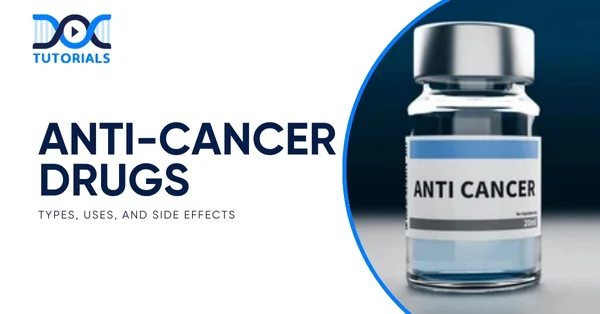Anti-Cancer Drugs: Types, Uses, and Side Effects

Anti-cancer drugs comprise a crucial group of medications in pharmacology that are specifically used to treat cancers. However, apart from having therapeutic value, they also have associated side effects that need prompt management in cancer patients.
If you are preparing for the NEET PG exam, having a comprehensive understanding of the classification, uses, and side effects of anti-cancer drugs is crucial. Continue reading to learn about cancer drugs and their associated side effects, enabling a better clinical practice.
What are Anti-Cancer Drugs?
Also known as anti-neoplastic drugs, anti-cancer drugs are a group of medications that are used to treat cancer. These cancer drugs work by interfering with the growth and spread of cancer cells, preventing metastasis. They are known to destroy, or slow the growth of cancer cells or shrink the size of the tumour before surgery.
What are the Different Types of Anti-Cancer Drugs?
There are different types of anti-cancer drugs which are used depending on the type and severity of cancer.
These cancer drugs are broadly classified into 4 major groups based on their mechanism of action: chemotherapy, targeted therapy, hormone therapy, and immunotherapy. Anti-cancer drug classification is mentioned in the following section:
- Chemotherapy
Chemotherapy drugs are administered to kill the fast-growing cancer cells in the body and reduce their chances of metastasis. It is also used to cure cancer in cases of curable cancers. Depending on the type and severity of cancer, a single or a combination of chemotherapy drugs is administered in 3 methods:
- As injectables
- As a topical medication
- As oral pills
Some of the examples of chemotherapy drugs are:
- Methotrexate
- Vincristine
- Cyclophosphamide
- Doxorubicin
- Targeted Therapy
Targeted therapies fall under the umbrella of personalised medicine, also known as precision medicine, which targets cancerous cells and blocks specific molecular pathways. These drugs are known to target and destroy cancer cells, leaving the normal, healthy cells of the body intact.
The doctor performs a genetic test to assess your eligibility as a candidate for the therapy, which helps the doctor determine the appropriate drug for your particular cancer treatment. Some of the common drugs used in targeted therapy for cancer treatment are:
- Alectinib (Alecensa)
- Imatinib (Gleevec)
- Palbociclib (Ibrance)
- Bevacizumab (Avastin)
- Ibrutinib (Imbruvica)
- Hormone Therapy
Some cancerous tumours depend on hormones to grow, which are treated by hormone therapy. Hormone therapy alters or blocks the hormones that facilitate the growth and metastasis of cancer cells.
Some examples of anti-cancer drugs widely used in hormone therapy are:
- Anastrozole (Arimidex)
- Letrozole (Femara)
- Tamoxifen (Nolvadex)
- Leuprolide (Lupron)
- Fulvestrant (Faslodex)
- Immunotherapy
Immunotherapy treats a wide range of cancers, utilising the body’s immune system to identify and destroy cancer cells. Immunotherapies block the mechanism used by cancer cells to evade the body’s immune system.
Provided alone or as an adjuvant therapy, Immunotherapy drugs are administered as an infusion or oral medication, depending on the type and severity of the cancer. Some of the commonly used anti-cancer drugs in immunotherapy are:
- Pembrolizumab (Keytruda)
- Atezolizumab (Tecentriq)
- Ipilimumab (Yervoy)
- Nivolumab (Opdivo)
What are the Uses of Anti-Cancer Drugs?
Anti-cancer drugs are mainly used to treat malignant or cancerous tumours. Its mechanism of action involves destroying cancer cells and preventing the further growth and metastasis of the tumour. Cancer drugs are also used as supportive treatment to shrink the tumour or to kill any remaining cancer cells.
What are the Side Effects of Anti-Cancer Drugs?
Anti-cancer drugs can cause serious side effects which may vary from one person to another, requiring immediate management. The following section mentions some of the side effects of cancer drugs that are commonly seen in patients:
- Nausea and Vomiting
Cancer patients often suffer from nausea and vomiting, either from taking pain medication or from anxiety. Taking anti-cancer drugs on an empty stomach can also trigger nausea and vomiting.
- Hair Loss
Commonly known as Alopecia, hair loss is a prevalent side effect of chemotherapy, where the anti-cancer drugs cause the hair on your head to fall out. Hair again grows back after completing the treatment, usually within two to three months.
- Neutropenia
Chemotherapy targets the fast-growing cells of the body. It kills them, including both healthy white blood cells and cancer cells, resulting in a decrease in the number of white blood cells and leading to neutropenia.
- Blood Clots
Blood clots that eventually lead to deep vein thrombosis are formed in the deep veins of the thigh, pelvis or lower leg in patients receiving chemotherapy. When these clots break off and become lodged in the lungs, a pulmonary embolism develops, causing difficulty breathing.
- Chemo Brain
Anti-cancer drugs can cause brain fog in cancer patients, which leads to difficulty in remembering things or trouble concentrating. Cancer patients can manage this condition by being physically active, getting proper rest, and keeping a record of their daily plans.
- Lymphedema
If the anti-cancer drugs damage a lymph node or a vessel, the lymphatic fluid will not be able to drain properly, causing it to build up under the skin, which eventually leads to swelling —a condition known as lymphedema.
- Anemia
Cancer drugs can kill healthy red blood cells in the process of destroying cancer cells, resulting in a decrease in the number of red blood cells in the body, which can cause anaemia. The symptoms of anaemia include rapid heartbeat, dizziness, weakness, and faintness.
- Mouth Problems
Some cancer patients suffer from mouth problems such as mouth sores, dry mouth, recurrent oral infections, and tooth decay, which are some common side effects of anti-cancer drugs, occurring as a result of damage to the salivary glands and tissues.
- Thrombocytopenia
The risk of bleeding and bruising increases when your platelet count becomes low, as platelets play a crucial role in clot formation. Anti-cancer drugs decrease the platelet count, which leads to a condition known as thrombocytopenia.
- Fertility Issues in Males and Females
Cancer drugs affect the reproductive organs, causing fertility issues in males as well as females. They may even be harmful and cause miscarriage. Hence, it is recommended to be on birth control during cancer treatment.
- Apetite and Weight Loss
Cancer patients who are on anti-cancer drugs might lose their appetite and eat less than their body’s requirement, which eventually leads to malnutrition. They alter the sense of taste and smell, making you feel full even after eating a small quantity of food.
What Precautions to Take for Anti-Cancer Drugs?
Although lifesaving, anti-cancer drugs are strong and should be handled carefully by healthcare personnel while administering the drug. People without cancer should wear proper PPE (Personal Protective Equipment) before handling anti-cancer drugs.
Go through the following safety measures that are recommended for the caregiver of cancer patients:
- Handling Body Waste
Anti-cancer drugs are eliminated from the body through urine, bowel, vomitus, and blood for 2 to 3 days after the treatment. The precautionary measures should be followed during elimination:
- Close the lid and flush after using the toilet.
- Men should sit and urinate to avoid splashing.
- Proper handwashing should be done after using the toilet.
- Wear gloves when handling body waste, during dumping, or cleaning, and follow with appropriate hand washing.
- If the patient has an ostomy, colostomy bags should be emptied after wearing gloves.
- Handling Sexual Contact
The following precautions will keep your partner from being exposed to cancer drugs:
- Condoms should be used by the person receiving chemotherapy or their partner during intercourse or oral sex for at least 2 to 3 days after the treatment.
- As anti-cancer drugs have teratogenic (substances causing harm to the developing foetus) properties, it is recommended to use birth control to prevent pregnancy during cancer treatment.
- Handling Medication or Body Fluid Spill
Spillage of medication or body fluids can be handled by following the safety measures mentioned below:
- Wear gloves and use paper towels to wipe the area.
- The area should be adequately cleaned with soap and water and rinsed with paper towels.
- The waste material should be placed in leak-proof plastic bags or special waste containers, followed by proper hand washing.
- Handling Laundry and Trash
If trash and laundry are contaminated with body fluids after receiving anti-cancer drugs, the following safety measures are recommended while handling:
- Wear gloves before touching the contaminated trash or laundry.
- Place the trash in leak-proof plastic bags or special waste bags and keep it with regular trash.
- The contaminated laundry should be washed immediately. If that is not possible, the dirty laundry should be placed in a leak-proof bag and washed as soon as possible, wearing gloves to prevent contamination.
- The contaminated laundry should be washed separately and should not be mixed with other laundry.
FAQs about Anti-Cancer Drugs
- What are the best drugs for cancer?
The best drugs for cancer fall under targeted therapy, and they are:
- Alectinib
- Palbociclib
- Ibrutinib
- What is the most common cancer drug?
The most common drug prescribed by oncologists is Anastrozole, which reduces the estrogen level in the body and helps in curing breast cancer.
- What is the new anti-cancer drug?
The FDA (Food & Drug Administration) approved the newest anti-cancer drug, Telisotuzumab Vedotin-tlv, on May 14, 2025. It is an antibody and microtubule inhibitor conjugate recommended for the treatment of advanced cancer.
- Why is vincristine prescribed?
Vincristine is a common chemotherapy medication that falls under vinca alkaloids, used to treat a wide range of cancers such as lymphoma, leukaemia, Wilms’ tumour, and neuroblastoma.
Conclusion
Cancer has become prevalent in recent years, and the anti-cancer drugs have proven to be highly effective in curing a wide range of cancers, making it an essential topic in the medical field. Learning about anti-cancer drugs, including their types, uses, side effects, and safety measures, leads to better treatment outcomes during clinical practice.
Strengthen your NEET PG preparation by watching the video lectures and solving the questions on Qbank provided by DocTutorials, which are prepared by experts in the medical field.
Join DocTutorials today and explore our NEET PG course to excel in your medical career.
Latest Blogs
-

NEET PG Exam 2025- Date, Pattern, Marking Scheme, Subject Wise Weightage, and Exam Mode
NEET PG Exam 2025 is the ultimate gateway for medical graduates aspiring to pursue postgraduate courses in medicine, including MD,…
-

INI CET Exam 2025: Your Roadmap to Success – Key Topics, Strategies, and Lessons from Last Year’s Papers
The INI CET exam is more than just a test; it’s a significant milestone for many medical students aiming to…
-

INI CET Exam Success: Previous Year Question Papers & Ultimate Guide – INI CET PYQ
One can feel overwhelmed while preparing for the INI CET (Institute of National Importance Combined Entrance Test). A vast syllabus,…




